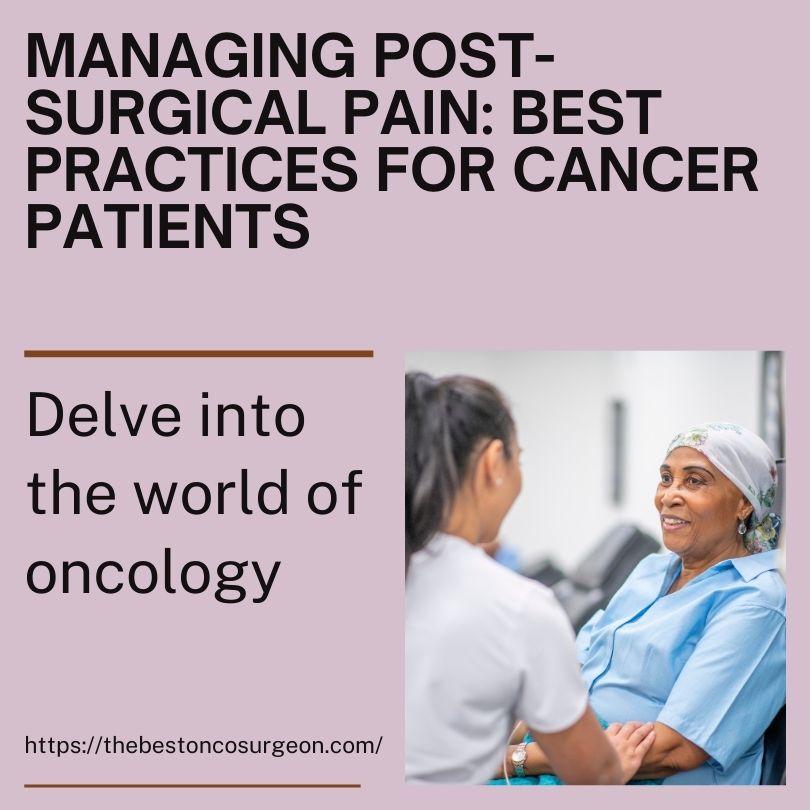Introduction
Post-surgical pain can be a major hurdle toward cancer patient’s recovery. When you effectively manage the pain, it not only improves your lifestyle but also fastens the healing process. This blog outlines ways to help ease post-surgical pain in cancer patients, enabling them to recover as quickly and comfortably as possible.
Post-op Pain in Cancer Patients
Post-surgical pain among cancer patients can be highly variable, determined by the nature of surgery performed as well as multiple factors ranging from individual pain thresholds to non-cancer-related health indicators. These may be acute (occurring immediately after surgery but usually improving as healing proceeds) or chronic pain, which can persist for months to years if not treated effectively.
Why Successful Pain Management is Important
Efficient pain management has multiple benefits. It helps speed up your recovery process, decrease complications, and avoid the potential development of chronic pain. Additionally, controlling pain allows patients to better tolerate other aspects of their recovery, such as physical therapy and rehabilitation.

Pain Management Strategies
Medications
- Opioids: These are strong pain relievers that doctors may prescribe for severe post-surgical pain. They must be used responsibly due to the high likelihood of addiction and side effects.
- Non-opioid analgesics: Acetaminophen and nonsteroidal anti-inflammatory drugs (NSAIDs) such as ibuprofen are frequently applied to moderate pain points.
- Antidepressants and anticonvulsants: These medications are sometimes given for nerve pain, which can be effective in some types of post-surgical treatment.
Non-Pharmacological Methods
- Physical therapy: Following a physical therapist’s recommendations can help lower pain and improve mobility. Manual therapy and gentle exercise techniques are helpful.
- Cognitive-behavioral therapy (CBT): CBT helps patients manage pain by changing the way they perceive it, reducing stress, and improving coping strategies.
- Traditional Chinese Medicine (TCM) – Acupuncture and acupressure: Acupuncture is often seen as the gold standard for pain relief in some patients.
Integrative Treatment
- Nutrition and supplements: A proper diet, with the right supplement support to help heal tissues function optimally, is an excellent way of reducing overall inflammatory burden, assisting in managing pain.
- Mindfulness & meditation: Mindfulness and meditation can alter the experience of pain, making it minimal or more tolerable, and also have a profound effect on mental health.
Customized Pain Plans
Managing pain should be according to the individual’s requirements. A multidisciplinary team performs a variety of diagnostic tests, exams, and provides care to address each person’s unique pain.

Role of Onco Surgeons in Pain Management
Pre-operative patient education involves anticipating pain and addressing how it can be managed. Post-surgical follow-up is important to fine-tune pain management as needed, ensuring relief can be maintained during the healing period.
Patient Education and Self-Management
Educating patients on how to describe their pain levels properly is crucial. They can learn self-care techniques like relaxation exercises and the application of heat or cold packs to control pain at home.
Assessment and Adjusting Pain Management Plans
Healthcare providers need to regularly assess the pain management plan for its effectiveness. Modifications should be pursued as warranted by patient response to maintain effective pain relief.
Innovations in Pain Management for Cancer Surgery
Pain management is a continually evolving field. Innovations such as nerve blocks, newer pain medications, and minimally invasive surgical techniques are improving outcomes for cancer patients. Staying informed about these advancements can help patients and healthcare providers make the best decisions for pain management.
Summary
In the recovery journey of cancer patients, comprehensive pain management is indispensable. Personalized care plans, in conjunction with medication and non-pharmacological methods, will be tailored specifically for patient needs to provide a comfortable recovery. Patients should work with their healthcare team to figure out the best pain management approach for them.




